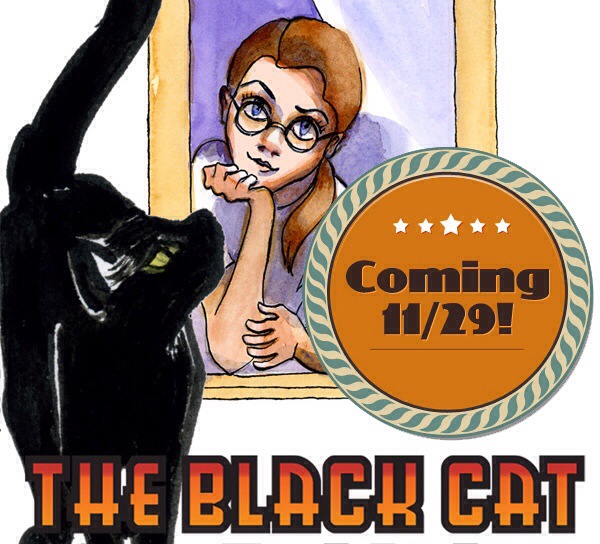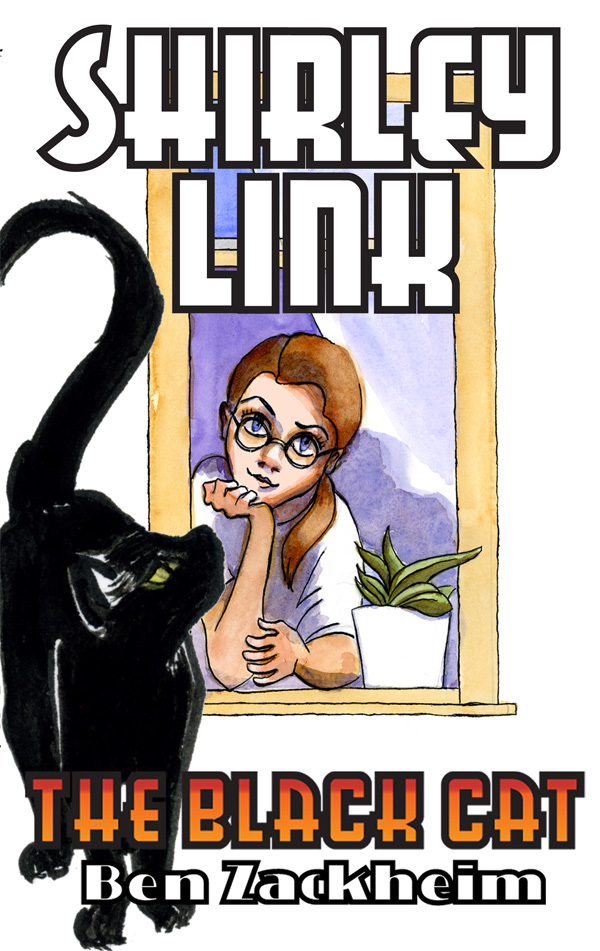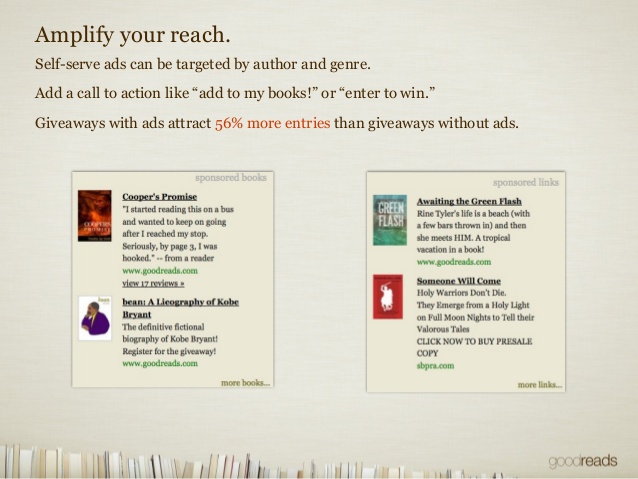
by Ben Zackheim | Nov 29, 2013 | Shirley Link & The Black Cat, Writing |
 Our hometowns leave an impression. They help us define ourselves, for good or ill. My hometown of Santa Fe, NM was like a faceless fifth member of the family. I alternated between hating it and loving it, like a sibling who read my diary and then gave me a thoughtful birthday present. Its alternate routes, and hidden alleys and beautiful views and eccentric homeless citizens made for an adventurous childhood.
Our hometowns leave an impression. They help us define ourselves, for good or ill. My hometown of Santa Fe, NM was like a faceless fifth member of the family. I alternated between hating it and loving it, like a sibling who read my diary and then gave me a thoughtful birthday present. Its alternate routes, and hidden alleys and beautiful views and eccentric homeless citizens made for an adventurous childhood.
It was a good place to grow up and a horrible place to grow up. It had awful schools, which I miraculously avoided one way or another, and an intense friction between the Latino, White and Native American populations. It also had the richest cultural life in America, with a fascinating history and artists in every other house. Its winters were cold and snowy. Its summers were hot and dry. Its springs were rainy, the air filled with the smell of oncoming storms. There was a silence that spoke to you. There was poverty that could take your breath away.
It’s incredible that we all see these elements in our hometown. Maybe you grew up somewhere that was the exact opposite from where I did. A rural town maybe. Or a big city. But I bet you had the same extremes, and I bet they helped define you and how you see the world around you.
I was lucky. I ended up loving my hometown. I still yearn for it and all it promises. I see where it falls short, and I still love it. But so many people I know can’t stand where they came from. They’re out and they’re never going back. I wanted to explore that dynamic in a Shirley Link book to better understand it. I also wanted to tell a story, a hopeful one, to kids who are struggling with where they are.
In Shirley Link & The Black Cat, a young man, 17, and his girlfriend, also 17, are the prime suspects in a string of robberies. There’s very little evidence, if any, that they did anything wrong. But that doesn’t stop everyone, even Shirley for awhile, from jumping to conclusions. I tapped into a deep sadness as I wrote about them. They were flawed — mean, odd, petty. But they were that way for a reason. They’d constructed incredibly complex and effective weapons against their community, which, for whatever reason, decided they were outcasts. And they found each other so they could have something in their lives that wasn’t mean, odd or petty.
As I wrote this growing up story I rooted like hell for them. I didn’t know what would happen. It wasn’t mapped out. In the end, I depended less on my need for a happy ending than I did on my ever-developing sense of what we need from our youth. We need support and understanding. We need company. We need community. Either our family, school and hometown provides these things or they don’t. And if they don’t? My conclusion is that we still gravitate toward what will make us feel kind, loved and understood.
It made for the most realistic adventure in my middle school reader series. There are no pirates, or magic safes, or valuable comic books. Just two teens caught in a mess. And a fourteen year old amateur sleuth who wants to help, and who grows up a little bit in front of our eyes.
by Ben Zackheim

by Ben Zackheim | Aug 6, 2013 | Book Promotion, Writing |
I talk to a lot of writers, and one of the most common questions I get is, “what can Goodreads do for me?”
The answer is, “Goodreads is good for creating interest around everything that has to do with books”. As a reader, a writer, or a reviewer you can lose yourself in Goodreads if you plow through the horrible interface and abandon yourself to it. I’ve been a member since January, 2012 and I’ve only skimmed the surface. But one feature (besides ads) that I’ve benefited from over time is the Goodreads giveaways feature.
After running a number of Goodreads giveaways I want to help dispel any confusion about why or when to run them (I’ll do ‘how’ in another post). As an author I’ve had hundreds of people add my books to their shelves using contests. It’s worth every minute I’ve invested.
Okay, so the most frequently asked questions are:
1) What are the Goodreads giveaways good for?
Simple. They get your book in front of hundreds, or even thousands of people. And not just any people, READING PEOPLE. Our favorite people.
When a reader enters the contest they are opted-in to add your book to their Goodreads shelves. That means most entrants will have your book added when they enter. So what? you may ask. The big deal here is that if your book is not released yet then everyone who added the book to their shelves will receive an email when your book arrives! Let me repeat that, if you are promoting a book by doing a giveaway on Goodreads, and the book is pre-release, everyone who adds your book to their shelves while entering your contest will receive a launch email from Goodreads.
Yeah, it’s awesome.
2) Can I run a contest for a book that I’ve already released?
Yup, and it will definitely help you get exposure, too. The downside is that there will be no launch email sent out by Goodreads since your book is already out there. But you will get on a bunch of shelves and you’ll be able to get reviews, plus some new friends to follow your Goodreads status and event updates.
3) How can I maximize success?
Two things, run the contest for one month. This gives it time to find traction. Two, advertise the giveaway on Goodreads. This will give you the best chance to find people who are interested in books like yours.

If you’re doing a giveaway for a pre-release, then do your first contest 3-5 months before launch to build buzz. You’ll need to give away proofs, because, well the book isn’t out yet! Also important to note, you cannot give away ebooks at this time.
I hope this clears up any confusion about what Goodreads giveaways are good for. Did I do a good job of that? Let me know in the comments!
To read:
How to set up Goodreads giveaways
Don’t miss this priceless slide show presentation that Goodreads gave recently about how to promote your books on Goodreads!
Does advertising on Goodreads work?
The Ultimate Guide to Goodreads for Authors
by Ben Zackheim
by Ben Zackheim | May 21, 2013 | Writing |

“Now I must gamble.” Sherlock’s eyes focused on something no one else could see. Numbers and data and a nose for human nature washed over a single slight sound that he’d heard three seconds prior. He hoped the sound would be slightly louder next time.
Holmes kneeled before a one ton safe in a bank, surrounded by gentlemen, friends of a famous boor. All of them wanted nothing more than to see him fail.
***
The day before, challenged by a man of leisure at M. Stringer’s residence, Holmes showed an emotion that cut through seven levels of impropriety. It took most in the room aback. For it is one thing to laugh loudly, with an abandon usually reserved for a child. It’s quite another to be an unwelcome guest in the Stringer home, and to emit such glee without a proper handkerchief. But most unsuitable, and the final challenge to all civility everywhere, was that it was the infamous Sherlock Holmes who laughed amongst London’s select.
To M. Stringer, it was a horn in the fog of his dull life. He followed the guffaw to our detective and he asked simply what was so funny.
“Your guest here,” Sherlock said, almost with a moan, “believes his safe cannot be cracked. What is it you said?”
The man he addressed, Edward Hopper, Manufacturer, was red in the face. His fists clenched tighter than his teeth, which could be heard crackling just underneath the contempt in the detective’s voice. “I said precisely what you said, Holmes. My company’s new safe is thief proof.”
“And I say that is a threat to my livelihood! Would you care to make a wager? I will open your safe in one try.”
“Preposterous! I will not be insulted like this!”
“If you wish to avoid the insult, you should not invite it in. Have you forgotten the wager?”
“Tomorrow. Noon. Sheffield Bank on …”
“On Baker St. Yes, yes I’ve been following your company’s claim that a safe for all secrets would be on the market by spring. Sheffield Bank it is. If I succeed, I get the contents of the safe. If I fail, I retire in disgrace, my friend.”
“It’s a deal. And you,” Hopper hissed, “are not a friend.”
“No need to be rude,” Sherlock said to the back of Hopper’s head. He turned to Stringer. “No verve in that one.”
“You do have a way, Sherlock. Even I’m irritated by you at times and I couldn’t care less about pot. Now what are you doing in my house? Besides antagonizing my guests.”
“Besides? Is there another reason I should be here?”
“I see. Well, your efforts to amuse yourself have shut down purse strings that are supposed to be opening by now for my wayward lads charity.”
Sherlock noticed everyone was glaring at him. No one was engaging M. Stringer’s associates, all of whom lined the corners, ledgers in hand, empty of numbers and figures for wayward boys.
“Sorry about that,” Sherlock said, as he reached for his clip. “How much to even the score do you think?”
“Oh, I’d say 100 pounds by now. Probably more with the holidays upon us.”
Sherlock’s brow raised and he snapped his clip shut. He put it back in his chest pocket. “Yes, well. Let’s hope I find something in the cracked egg tomorrow at noon, then.”
M. Stringer watched the detective take his long strides right out the front door. He shook his head, but he smiled.
***
In the bank, the gathering of a plurality of London’s wealth, formed a circle around the safe as if it were a dying dignitary. If Sherlock had his way, that’s exactly what it would be. The detective broke the envelope of silent anticipation with a nasty cough as he entered the circle and approached the safe with great speed. Like a child laying claim to the final candy in all the Queen’s kingdom.
The crowd moved to one side of the safe so they could get a better view of the tragedy or comedy that was about to unfold. Holmes ran his hand over the steel, knocked it with both sets of knuckles, and fell to his knees without laying down a cloth first. On any other day, that alone would have been the talk of the elite. But today was special. Today, Sherlock’s silent enemies, the leeches of high society, constantly in fear of taking one step too far and falling into another of Holmes’ traps, wanted to witness his end. They wanted to see him beaten, humbled, human. If anything could better him, it would be a ton of secured steel and a boast too far.
He yanked off his gloves, put his ear to the safe and gently twisted the safe’s dial with the very tip of his naked fingertips. His touch was so light it appeared as if he were trying to feel the strands of a spiders web.
“Now I must gamble,” Sherlock said. His eyes froze on Hopper. Hopper, for his part, was unsettled by this attention. His eyes darted back and forth from Sherlock’s to the safe’s dial. Finally, with a slight smirk, Holmes settled on the number 73.
Holmes turned the dial the other direction. All attention went to Hopper in that moment. Murmurs of “73. 73? 73!” and “Is it right?” and finally one voice pushed through them all.
“Is 73 the first number, Hopper?”
Hopper said nothing, which said everything.
When Sherlock put his ears to the safe again, the nerves in the room gave way to elation. For Sherlock, as if determined to give these men the pleasure of their lives, suddenly appeared frightened.
“Hopper!” Sherlock yelled.
“Mr. Hopper to you, Holmes.”
“Yes, yes. You came here last night to secure the safe.”
M. Hopper eyed his company and smiled as calmly as he could manage. “Of course I did. I wanted to make sure you hadn’t already sabotaged our product.”
Sherlock smiled, pleased at the inconvenience his reputation had caused. “Instantly, you are my second favorite person in the room. But as you protected the sanctity of the safe, was anyone with you when you were here?”
“No. I was alone.”
“I think not, sir.”
“Excuse me, but are you questioning my truthfulness?”
“I would never think of it,” Sherlock said as he stood and approached Hopper with the same gumption that unsettled them when he’d first entered the bank to play with his new toy. “But I do question your sense. Or should I say, senses. It was cold last night, was it not?”
“I fail to see…”
“Was it, or was it not one of the coldest nights of the winter?”
“I’d say yes, but…”
And in this cold, did you notice anyone outside the bank in need of cover? Someone small?”
“No,” Hopper said, simply. Everyone in that room had seen Holmes do this before. When he asked leading questions, he was leading you to your doom. The chill outside likely felt more welcoming than the chill in that room.
“Did you leave the safe unattended?”
“I did not.”
“Curious.”
“How could that possibly be a curiosity?”
“For some poor soul is inside the safe right now.”
The chatter that echoed off the high ceilings was deafening.
“Nonsense!” Hopper yelled over the ruckus. “The shelves are too small for a man or woman to fit in!”
“Which is why I’m afraid a small boy or girl followed you into the bank last night, desperate to find some comfort and slipped into the safe while you were turned.”
“What simpleton would do such a thing?”
“A desperate and scared child, perhaps. Ssh!”
Hopper flinched. Shocked to be shushed, he would have protested if it hadn’t been for a small sound, barely perceptible in the silence that Sherlock had demanded.
“…held…”
“What was that?” one man called out.
“I did hear a cry!” said another.
A tall gentleman, pale and gaunt with ferocious eyes, ran to Holmes side. He put his ear to the safe.
“…held neeee…”
The sound appeared to come from the safe. It was muffled, small, desperate.
“A child calling for help!” Holmes new companion cried. “Hopper!”
But Hopper was already dialing the rest of the combo. He swung the safe’s door open and the crowd gasped. They’d come to be entertained and they’d speak of this day for the rest of their lives.
For in the safe was not a child, but a dead fish. Its bulging eyes glared back at the audience to this mass deception.
Each man knew that, somehow, this meant Sherlock Holmes had won again!
The sound of one man clapping broke the silence. Everyone turned to watch Holmes trot up the steps to the balcony above. “One chance! And the safe is open.”
“What nonsense is this?” Hopper hollered. “The wager was to crack the safe!”
“And there it is. Open!”
M. Thompson (whom Holmes had revealed as an embezzler five years prior) asked loudly, “What are you playing at, Holmes? Where is the child?”
“Right there!” Holmes cried, with delight. He pointed to the thin gentleman who had accompanied Holmes at the safe. “Gentlemen, meet Jorge Garcia, master of puppetry and ventriloquism, favorite person in the room. His specialty, if you haven’t guessed yet, is in throwing his voice. You can see him every Thursday night at The Carriage House Theater with his wooden partner, Platitude Pete. Delightful stuff!”
M. Garcia took a bow but only the detective clapped.
“Jorge provided the voice of little Timmy, stranded in the safe, thanks to the negligent Mr. Hopper.”
“Held! Held neeeeee!” the ventriloquist cried out, with a smile.
“Which is the closest a man can get to saying Help me! without moving his lips.” Some men in the audience mouthed the word “help” as a test. They mumbled and nodded amongst themselves as Hopper boiled over.
“Then how did you know the first number was 73?” asked Thompson.
“That’s a simple matter of reading Hopper’s face. As my fingers moved the dial to the lower 70s, his eyes grew black and his blinking increased. But that trick is only good for one of the numbers. I wasn’t going to push my luck, so I signaled Jorge to give us his best holler-from-a-one-ton-safe voice.”
“Now see here! The deal was that you crack this safe, not manipulate every man’s sense of decency and chivalry!” Hopper shouted, his voice tinged with the crackle of a man who had lost a sizable portion of his reputation.
Sherlock sighed as he sauntered back down the stairs. “But that’s the point, man! You can make a safe as safe as its owners make it. A thief doesn’t care about the strength of the safe. A thief cares about how to get into it. This is why no safe will ever be free of the worst of us, present company included.”
“Where did the fish come from then?” asked Jorge, as he lifted the thing from the safe and dangled it.
“Our dear Hopper thought it would be a nice gift for me, should I succeed. Though I’m sure, if you asked him, he’d say he put it there to ridicule me as he’d planned to open it for me after I failed and revealed a treasure he thought me worthy of. Believe what you will, my esteemed audience, but personally I’m delighted to know that he entertained the idea that my success was possible. It’s more than his bravado would have us know.”
And, with that, the great detective, not yet ready to retire in disgrace, swept from the room as if late to his next game.

 Our hometowns leave an impression. They help us define ourselves, for good or ill. My hometown of Santa Fe, NM was like a faceless fifth member of the family. I alternated between hating it and loving it, like a sibling who read my diary and then gave me a thoughtful birthday present. Its alternate routes, and hidden alleys and beautiful views and eccentric homeless citizens made for an adventurous childhood.
Our hometowns leave an impression. They help us define ourselves, for good or ill. My hometown of Santa Fe, NM was like a faceless fifth member of the family. I alternated between hating it and loving it, like a sibling who read my diary and then gave me a thoughtful birthday present. Its alternate routes, and hidden alleys and beautiful views and eccentric homeless citizens made for an adventurous childhood.





